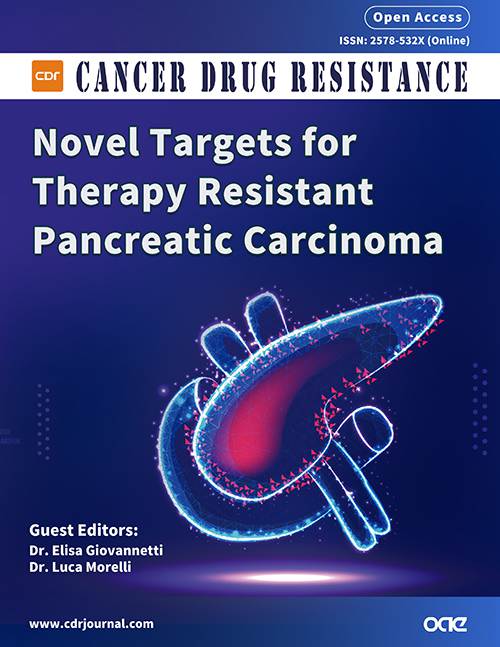
Topic: Novel Targets for Therapy Resistant Pancreatic Carcinoma
Guest Editors
Dr. Elisa Giovannetti
Lab Medical Oncology, VU University Medical Center, Cancer Center Amsterdam, Amsterdam, The Netherlands; Cancer Pharmacology Lab, AIRC Start-Up Unit, University of Pisa, Pisa, Italy.
Special Topic Introduction
Pancreatic cancer is a highly lethal disease: almost all patients develop metastases and most current treatments have minimal impact on survival. Therapeutically, this cancer is poorly responsive, largely due to both inherent and acquired drug resistance.
Depending on the stage, a multidisciplinary management approach with surgery and (neo)adjuvant therapies as well as multiagent chemotherapy regimens are recommended. In addition, pancreatic cancer patients should be offered comprehensive germline testing and integrated supportive care.
Accumulating evidence suggests that pancreatic cancer chemoresistance is multifactorial, with an interplay between tumor cells and different components within the tumor microenvironment, while extracellular vesicles are recently emerging for their potential role in transferring aggressive phenotype features. Altered metabolism also contributes to modulation of neo-angiogenesis, apoptosis and drug targets, conferring a resistant phenotype.
As a modality to overcome chemoresistance, a variety of experimental compounds inhibiting key oncogenic and metabolic pathways emerged as a promising approach to potentiate the standard treatments for pancreatic cancer in preclinical studies, but these results have still to be confirmed in clinical trials.
Thus, this Special Issue will cover the most recent research and progress in our understanding of the biology of PDAC chemo/radio-resistance. In addition, we will discuss innovative surgical and pharmacological strategies in the pre-/clinical setting to overcome PDAC resistance, either through developing novel treatments and combinations or by precision/personalized medicine approaches. Both original and review papers are welcome.
Depending on the stage, a multidisciplinary management approach with surgery and (neo)adjuvant therapies as well as multiagent chemotherapy regimens are recommended. In addition, pancreatic cancer patients should be offered comprehensive germline testing and integrated supportive care.
Accumulating evidence suggests that pancreatic cancer chemoresistance is multifactorial, with an interplay between tumor cells and different components within the tumor microenvironment, while extracellular vesicles are recently emerging for their potential role in transferring aggressive phenotype features. Altered metabolism also contributes to modulation of neo-angiogenesis, apoptosis and drug targets, conferring a resistant phenotype.
As a modality to overcome chemoresistance, a variety of experimental compounds inhibiting key oncogenic and metabolic pathways emerged as a promising approach to potentiate the standard treatments for pancreatic cancer in preclinical studies, but these results have still to be confirmed in clinical trials.
Thus, this Special Issue will cover the most recent research and progress in our understanding of the biology of PDAC chemo/radio-resistance. In addition, we will discuss innovative surgical and pharmacological strategies in the pre-/clinical setting to overcome PDAC resistance, either through developing novel treatments and combinations or by precision/personalized medicine approaches. Both original and review papers are welcome.
Submission Deadline
31 Aug 2022
Submission Information
For Author Instructions, please refer to https://www.oaepublish.com/cdr/author_instructions
For Online Submission, please login at https://www.oaecenter.com/login?JournalId=cdr&IssueId=cdr220831947
Submission Deadline: 31 Aug 2022
Contacts: Bella Zhao, Assistant Editor, [email protected]












